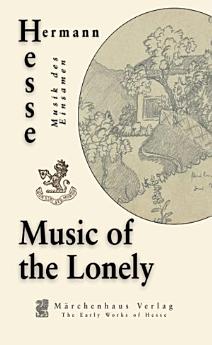Music of the Lonely
The Early Works of Hermann Hesse Book 34 · Marchen Press
Ebook
184
Pages
family_home
Eligible
info
reportRatings and reviews aren’t verified Learn More
About this ebook
"Musik des Einsamen" (Music of the Lonely), first printed by Eugen Salcher in Heilbronn in 1915, stands as Hesse's most significant wartime poetry collection, published as Europe descended into the mechanized slaughter of World War I. Written during Hesse's self-imposed exile in Switzerland after his controversial anti-nationalistic stance alienated him from German literary society, these poems articulate an intensely personal response to collective madness. The collection reveals Hesse not merely as novelist but as a formidable poet whose lyrical voice crystallized around themes of spiritual isolation and inner resistance against the martial fervor consuming Europe's intellectuals. The collection’s exploration of creative solitude as both affliction and necessity bridges romantic agony and modernist alienation, its austere beauty offering no consolation beyond art’s fleeting transcendence. Unlike the patriotic verse dominating German literature of 1915, Hesse's poems reject nationalistic sentiment in favor of contemplative withdrawal and philosophical inquiry. This collection represents his radical pivot toward Eastern philosophical traditions—particularly Buddhism and Taoism—as alternatives to Western rationalism's catastrophic failure. The poems function as meditative exercises where solitude becomes not personal misfortune but deliberate spiritual practice, establishing the philosophical framework that would later underpin his novel "Siddhartha." Hesse's poetic voice achieves its distinctive timbre here: simultaneously melancholic and transcendent, capturing the paradox of finding universal connection through profound isolation. This new edition features a fresh, contemporary translation of Hesse's early work, making his philosophical, existentialist literature accessible to modern readers from the original Fraktur manuscripts. Enhanced by an illuminating Afterword focused on Hesse's personal and intellectual relationship with Carl Jung, a concise biography, a glossary of essential philosophical terms integral to his writings (his version of Jungian Psychological concepts) and a detailed chronology of his life and major works, this robust edition introduces the reader to the brilliance of his literature in context. It not only captures the depth and nuance of Hesse’s thought but also highlights its enduring impact on the debates of the mid-20th century, contemporary culture and Western Philosophy across the 20th and into the 21st century.
About the author
Herman Hesse (1877-1962) navigated a life shaped by psychological turbulence that fundamentally transformed his literary vision following his pivotal encounter with Carl Jung's analytical psychology. After suffering a severe breakdown in 1916 amid his crumbling first marriage and the ravages of World War I, Hesse underwent intensive psychoanalysis with Jung's student J.B. Lang and later with Jung himself, sessions that would profoundly alter his creative trajectory. This Jungian influence became evident in his subsequent works, particularly "Demian" and "Steppenwolf," where the protagonist's journey toward individuation—Jung's concept of integrating the conscious and unconscious aspects of personality—emerges as a central theme. Hesse's correspondence with Jung continued for decades, their intellectual relationship deepening as Hesse increasingly incorporated Jungian archetypes, dream symbolism, and the notion of the shadow self into his narratives of spiritual seeking. The writer later acknowledged that Jung's therapeutic methods had not only rescued him from psychological collapse but had fundamentally reshaped his understanding of human consciousness, enabling him to transmute his personal suffering into the allegorical quests for wholeness that characterized his most enduring works.RetryClaude can make mistakes. Please double-check responses.
Rate this ebook
Tell us what you think.
Reading information
Smartphones and tablets
Install the Google Play Books app for Android and iPad/iPhone. It syncs automatically with your account and allows you to read online or offline wherever you are.
Laptops and computers
You can listen to audiobooks purchased on Google Play using your computer's web browser.
eReaders and other devices
To read on e-ink devices like Kobo eReaders, you'll need to download a file and transfer it to your device. Follow the detailed Help Center instructions to transfer the files to supported eReaders.











